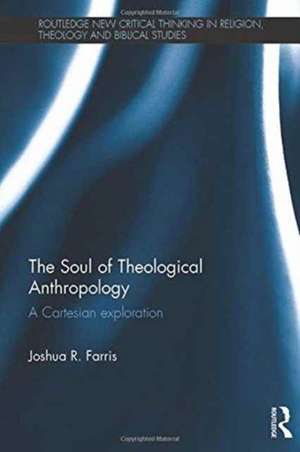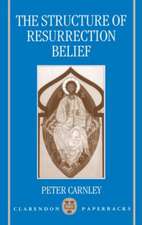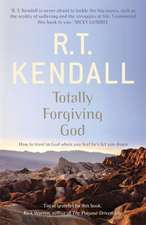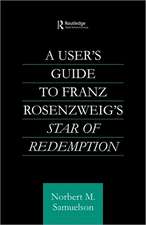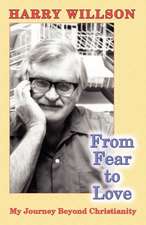The Soul of Theological Anthropology: A Cartesian Exploration: Routledge New Critical Thinking in Religion, Theology and Biblical Studies
Autor Joshua R. Farrisen Limba Engleză Hardback – 28 noi 2016
Din seria Routledge New Critical Thinking in Religion, Theology and Biblical Studies
-
 Preț: 313.38 lei
Preț: 313.38 lei -
 Preț: 310.22 lei
Preț: 310.22 lei -
 Preț: 310.80 lei
Preț: 310.80 lei -
 Preț: 294.30 lei
Preț: 294.30 lei -
 Preț: 294.47 lei
Preț: 294.47 lei -
 Preț: 311.59 lei
Preț: 311.59 lei -
 Preț: 325.53 lei
Preț: 325.53 lei -
 Preț: 311.59 lei
Preț: 311.59 lei -
 Preț: 311.41 lei
Preț: 311.41 lei -
 Preț: 311.41 lei
Preț: 311.41 lei -
 Preț: 295.00 lei
Preț: 295.00 lei -
 Preț: 309.74 lei
Preț: 309.74 lei -
 Preț: 316.66 lei
Preț: 316.66 lei -
 Preț: 311.41 lei
Preț: 311.41 lei -
 Preț: 386.77 lei
Preț: 386.77 lei - 26%
 Preț: 820.71 lei
Preț: 820.71 lei - 26%
 Preț: 764.69 lei
Preț: 764.69 lei - 18%
 Preț: 1059.45 lei
Preț: 1059.45 lei - 18%
 Preț: 1054.71 lei
Preț: 1054.71 lei - 18%
 Preț: 1054.71 lei
Preț: 1054.71 lei - 25%
 Preț: 823.34 lei
Preț: 823.34 lei - 18%
 Preț: 1054.71 lei
Preț: 1054.71 lei - 18%
 Preț: 1058.79 lei
Preț: 1058.79 lei - 18%
 Preț: 1054.71 lei
Preț: 1054.71 lei - 18%
 Preț: 1057.09 lei
Preț: 1057.09 lei - 18%
 Preț: 1059.45 lei
Preț: 1059.45 lei - 18%
 Preț: 1055.51 lei
Preț: 1055.51 lei - 17%
 Preț: 190.88 lei
Preț: 190.88 lei - 18%
 Preț: 1056.28 lei
Preț: 1056.28 lei - 18%
 Preț: 700.75 lei
Preț: 700.75 lei - 18%
 Preț: 1054.71 lei
Preț: 1054.71 lei - 25%
 Preț: 767.07 lei
Preț: 767.07 lei - 26%
 Preț: 877.59 lei
Preț: 877.59 lei - 18%
 Preț: 1054.71 lei
Preț: 1054.71 lei - 18%
 Preț: 1057.89 lei
Preț: 1057.89 lei - 26%
 Preț: 765.40 lei
Preț: 765.40 lei - 18%
 Preț: 1054.71 lei
Preț: 1054.71 lei - 18%
 Preț: 1000.27 lei
Preț: 1000.27 lei - 18%
 Preț: 1060.25 lei
Preț: 1060.25 lei - 26%
 Preț: 850.17 lei
Preț: 850.17 lei - 18%
 Preț: 1000.27 lei
Preț: 1000.27 lei - 18%
 Preț: 1059.45 lei
Preț: 1059.45 lei - 18%
 Preț: 1000.27 lei
Preț: 1000.27 lei - 18%
 Preț: 1054.71 lei
Preț: 1054.71 lei - 18%
 Preț: 1108.37 lei
Preț: 1108.37 lei - 26%
 Preț: 821.13 lei
Preț: 821.13 lei - 26%
 Preț: 820.32 lei
Preț: 820.32 lei - 18%
 Preț: 1054.71 lei
Preț: 1054.71 lei - 18%
 Preț: 1056.00 lei
Preț: 1056.00 lei - 18%
 Preț: 1057.89 lei
Preț: 1057.89 lei
Preț: 1108.37 lei
Preț vechi: 1351.68 lei
-18% Nou
Puncte Express: 1663
Preț estimativ în valută:
212.18€ • 218.34$ • 178.86£
212.18€ • 218.34$ • 178.86£
Carte tipărită la comandă
Livrare economică 01-15 martie
Preluare comenzi: 021 569.72.76
Specificații
ISBN-13: 9781472436511
ISBN-10: 1472436512
Pagini: 212
Dimensiuni: 156 x 234 x 19 mm
Greutate: 0.43 kg
Ediția:1
Editura: Taylor & Francis
Colecția Routledge
Seria Routledge New Critical Thinking in Religion, Theology and Biblical Studies
Locul publicării:Oxford, United Kingdom
ISBN-10: 1472436512
Pagini: 212
Dimensiuni: 156 x 234 x 19 mm
Greutate: 0.43 kg
Ediția:1
Editura: Taylor & Francis
Colecția Routledge
Seria Routledge New Critical Thinking in Religion, Theology and Biblical Studies
Locul publicării:Oxford, United Kingdom
Cuprins
Foreword Oliver D. Crisp
Introduction: A Cartesian Exploration in Tradition
Part 1: Cartesian Souls and Theological Prolegomena
1. A Cartesian Exploration in Natural Theology and Prolegomena
2. A Cartesian Exploration in the Story of Scripture and Personal Ontology
Part 2: Creation and the Origin of Souls
3. A Cartesian Exploration of the Soul’s Origin, Part 1
4. A Cartesian Exploration of the Soul’s Origin, Part 2
5. A Cartesian Exploration of the Embodied Soul
Part 3: Hamartiology, Soteriology and Cartesian Souls
6. A Cartesian Exploration of the Soul’s Origin, Original Sin, and Christology
7. A Cartesian Exploration of the Interim State and the visio Dei
Part 4: Cartesian Souls and Personal Eschatology
8. Picturing the Interim State as a Cartesian
9. A Cartesian Exploration of Personal Eschatology
Conclusion.
Bibliography
Index
Introduction: A Cartesian Exploration in Tradition
Part 1: Cartesian Souls and Theological Prolegomena
1. A Cartesian Exploration in Natural Theology and Prolegomena
2. A Cartesian Exploration in the Story of Scripture and Personal Ontology
Part 2: Creation and the Origin of Souls
3. A Cartesian Exploration of the Soul’s Origin, Part 1
4. A Cartesian Exploration of the Soul’s Origin, Part 2
5. A Cartesian Exploration of the Embodied Soul
Part 3: Hamartiology, Soteriology and Cartesian Souls
6. A Cartesian Exploration of the Soul’s Origin, Original Sin, and Christology
7. A Cartesian Exploration of the Interim State and the visio Dei
Part 4: Cartesian Souls and Personal Eschatology
8. Picturing the Interim State as a Cartesian
9. A Cartesian Exploration of Personal Eschatology
Conclusion.
Bibliography
Index
Notă biografică
Joshua R. Farris is Assistant Professor of Theology at Houston Baptist University, School of Humanities, The Academy and The Honors College, USA. He is also a member of the Department of Theology. He is Director over Trinity School of Theology. Presently, he is a fellow at Heythrop College, UK. His scholarly work has appeared inReligious Studies, Philosophia Christi, Philosophy and Theology, Heythrop Journal,andNeue Zeitschrift für Systematische Theologie und Religionsphilosophie (forthcoming). He is the co-editor of the Ashgate Research Companion to Theological Anthropology and the co-editor of Idealism and Christian Theology. Presently, he is finishing A Brief Introduction to Theological Anthropology and a co-edited project entitled Being Saved: Explorations in Soteriology and Human Ontology.
Recenzii
‘Recent interest in non-physicalist accounts of the human subject raises the question of how mind and body are integrated. In this ground-breaking book, Joshua Farris offers an answer through a consideration of the soul’s origin. His view combines the virtues of both creationism and emergentism, aiming to offer an account of the soul-body relationship that is both satisfying and non-arbitrary. Holding theology and philosophy in proper relationship, Farris’ excellent book offers arguments that are both well-informed and broad in scope. The issues he raises and the answer he offers deserve an ongoing place in contemporary discussion of Christian anthropology and philosophy of mind.’ – Jonathan Loose, Senior Lecturer in Philosophy & Psychology at Heythrop College, University of London, UK
‘Joshua Farris's The Soul of Theological Anthropology is a bold, brilliant defense of Cartesian philosophy of mind in the context of Christian theology. This much-needed challenge to contemporary secular and theological materialism is advanced with great clarity, insight, and rigor.’ – Charles Taliaferro, Professor of Philosophy and Department Chair at St. Olaf College, USA
‘Materialist or physicalist accounts of the human person--whether non-reductive or reductive--comport neither with scriptural revelation and its exigencies, nor with sound philosophical reflection on human consciousness. Given the current popularity of physicalist accounts, Joshua Farris's book is tremendously welcome. In my view, the greatest achievement of this wide-ranging book is that Farris raises, in a clear and erudite fashion, the most pressing issue for those who affirm that humans possess spiritual souls. Namely, given that the soul is distinct from the body and not subject to bodily demise, could it be that the human person is the soul, and if so then what status does the body have? Although I myself hold Thomistic views on these topics, Farris's bold and stimulating effort to retrieve a Christian Cartesianism makes this book required reading for everyone who cares about what it means to profess human ensoulment.’ – Matthew Levering, James N. and Mary D. Perry Jr. Chair of Theology, Mundelein Seminary, USA
‘Joshua R. Farris's highly original work explores the viability of a Cartesian substance dualism approach to personhood as a model for constructive theology. It not only offers a robust defense of substance dualism, but is also very distinctive in representing the first theologically constructive exploration of a Cartesian model of person-body substance dualism, making a case for its compatibility with the scriptural narrative on human beings, and reflecting systematically on human ontology in light of origins, embodiment, sin, beatific vision, Christology, the intermediate state, and resurrection. Of particular interest is his revitalising of the origin of the soul discussion and its implications, and his own novel stance on the soul's origins, drawing upon the resources of contemporary analytic philosophy of mind. Previously substance dualism could be breezily dismissed in philosophical discussion; this is no longer the case, and as substance dualism enjoys an important resurgence of interest within philosophy, Christian thinkers cannot afford to ignore it as among the live options. Farris's work is an essential read in this respect.’ – David Leech, Lecturer in the Philosophy of Religion, University of Bristol, UK
‘Farris’s monograph should be the text to which one appeals when one wants the most cutting-edge, thorough, and clear theological defense and construction of a substance dualist anthropology and doctrine of the intermediate state... This book is an object lesson in doing good theology.’ – James T. Turner, Jr., Fuller Theological Seminary in Journal of Biblical and Theological Studies
‘Farris’s The Soul of Theological Anthropology is highly recommended... In light of Farris’s arguments, it will not be easy for anyone to continue arguing that theological anthropology is best engaged in from a materialistic point of view.’ – Benedikt Paul Göcke, University of Oxford in Reading Religion
‘Contemporary and refreshing, Farris has succeeded in engaging in a considered and deliberate manner, the key questions regarding body and soul, and certainly gone some way in redeeming the Cartesian contributions to the theology.’ – Karen O’Donnell, Durham University, in Reviews in Religion & Theology
‘…this book is a rigorous, creative, well-informed analysis of various versions of a generic substance dualism… this is a wonderful book that is a must read for anyone who works on theological anthropology.’ – J. P. Moreland, Talbot School of Theology, Biola University, in The Journal of Theological Studies
‘…The Soul of Theological Anthropology arguably offers the best comprehensive defense and construction of a dualist anthropology published in recent years, primarily because of its robust engagement with philosophical, theological, and biblical material.’ – Christopher G. Woznicki, Fuller Theological Seminary, in Themelios
‘Farris' work is marked by clarity and argumentative rigor…. With more books like this one, the days of caricaturing the philosophical (i.e. analytic) theologian as uncaring of and careless with the Scriptures may soon come to an end.’ – Mark Hamilton, International Journal of Systematic Theology
‘Farris succeeds with his EC to make it plausible that the assumption of the substantial soul does not have to mean an undervaluation of the body. That is a valuable contribution to theological anthropology’ (translated from the Dutch) - Martine Oldhoff, Theologia Reformata
‘Joshua Farris's The Soul of Theological Anthropology is a bold, brilliant defense of Cartesian philosophy of mind in the context of Christian theology. This much-needed challenge to contemporary secular and theological materialism is advanced with great clarity, insight, and rigor.’ – Charles Taliaferro, Professor of Philosophy and Department Chair at St. Olaf College, USA
‘Materialist or physicalist accounts of the human person--whether non-reductive or reductive--comport neither with scriptural revelation and its exigencies, nor with sound philosophical reflection on human consciousness. Given the current popularity of physicalist accounts, Joshua Farris's book is tremendously welcome. In my view, the greatest achievement of this wide-ranging book is that Farris raises, in a clear and erudite fashion, the most pressing issue for those who affirm that humans possess spiritual souls. Namely, given that the soul is distinct from the body and not subject to bodily demise, could it be that the human person is the soul, and if so then what status does the body have? Although I myself hold Thomistic views on these topics, Farris's bold and stimulating effort to retrieve a Christian Cartesianism makes this book required reading for everyone who cares about what it means to profess human ensoulment.’ – Matthew Levering, James N. and Mary D. Perry Jr. Chair of Theology, Mundelein Seminary, USA
‘Joshua R. Farris's highly original work explores the viability of a Cartesian substance dualism approach to personhood as a model for constructive theology. It not only offers a robust defense of substance dualism, but is also very distinctive in representing the first theologically constructive exploration of a Cartesian model of person-body substance dualism, making a case for its compatibility with the scriptural narrative on human beings, and reflecting systematically on human ontology in light of origins, embodiment, sin, beatific vision, Christology, the intermediate state, and resurrection. Of particular interest is his revitalising of the origin of the soul discussion and its implications, and his own novel stance on the soul's origins, drawing upon the resources of contemporary analytic philosophy of mind. Previously substance dualism could be breezily dismissed in philosophical discussion; this is no longer the case, and as substance dualism enjoys an important resurgence of interest within philosophy, Christian thinkers cannot afford to ignore it as among the live options. Farris's work is an essential read in this respect.’ – David Leech, Lecturer in the Philosophy of Religion, University of Bristol, UK
‘Farris’s monograph should be the text to which one appeals when one wants the most cutting-edge, thorough, and clear theological defense and construction of a substance dualist anthropology and doctrine of the intermediate state... This book is an object lesson in doing good theology.’ – James T. Turner, Jr., Fuller Theological Seminary in Journal of Biblical and Theological Studies
‘Farris’s The Soul of Theological Anthropology is highly recommended... In light of Farris’s arguments, it will not be easy for anyone to continue arguing that theological anthropology is best engaged in from a materialistic point of view.’ – Benedikt Paul Göcke, University of Oxford in Reading Religion
‘Contemporary and refreshing, Farris has succeeded in engaging in a considered and deliberate manner, the key questions regarding body and soul, and certainly gone some way in redeeming the Cartesian contributions to the theology.’ – Karen O’Donnell, Durham University, in Reviews in Religion & Theology
‘…this book is a rigorous, creative, well-informed analysis of various versions of a generic substance dualism… this is a wonderful book that is a must read for anyone who works on theological anthropology.’ – J. P. Moreland, Talbot School of Theology, Biola University, in The Journal of Theological Studies
‘…The Soul of Theological Anthropology arguably offers the best comprehensive defense and construction of a dualist anthropology published in recent years, primarily because of its robust engagement with philosophical, theological, and biblical material.’ – Christopher G. Woznicki, Fuller Theological Seminary, in Themelios
‘Farris' work is marked by clarity and argumentative rigor…. With more books like this one, the days of caricaturing the philosophical (i.e. analytic) theologian as uncaring of and careless with the Scriptures may soon come to an end.’ – Mark Hamilton, International Journal of Systematic Theology
‘Farris succeeds with his EC to make it plausible that the assumption of the substantial soul does not have to mean an undervaluation of the body. That is a valuable contribution to theological anthropology’ (translated from the Dutch) - Martine Oldhoff, Theologia Reformata
Descriere
This book constructively develops a theological accounting of human persons by drawing from a Cartesian model of anthropology. Exploring a substance dualism model, the author highlights relevant theological texts and passages of Scripture, arguing that this model accounts for doctrinal essentials concerning theological anthropology.
